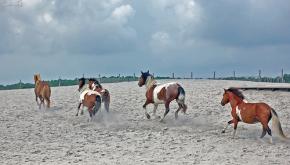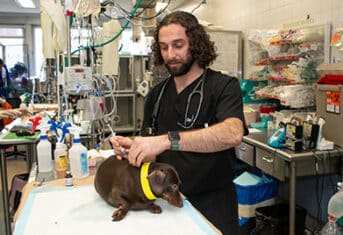Misty of Chincoteague

Misty of Chincoteague
I spent my summer vacation at the beach looking for Misty and Stormy. You may think I was hoping to play beach volley ball with recently crowned Olympic three-peaters, but I was looking for Chincoteague ponies. Misty and her foal Stormy inspired two of my favorite childhood books: Misty of Chincoteague and Stormy, Misty’s Foal, both books by Marguerite Henry.
Assateague and Chincoteague Islands are barrier islands on the eastern coast of the Delmarva Peninsula. From their names, you might think Misty and Stormy came from Chincoteague Island; today the wild ponies live on Assateague Island, just to the east of Chincoteague. Assateague Island is a National Wildlife Refuge and one of the few places in the United States where wild ponies can be seen. Divided between Maryland and Virginia, Assateague National Wildlife Refuge provides homes to two separate herds of ponies, one in each state. I was lucky enough to see the pony herd in Virginia from the beach road and also when using my binoculars from Memorial Park on Chincoteague Island.
Pinto ponies like Misty dominate the herd, although I saw one or two solid color ponies. Chincoteague ponies are ponies because of their small stature, although genetically they are more like horses. Scientists theorize the small stature of Chincoteague ponies resulted from adaptation to the harsh environment of Assateague Island — salty water, limited plants for grazing, and mosquitoes.
Misty of Chincoteague centers on Pony Penning Day, when during slack tide, the ponies swim to Chincoteague and the foals are auctioned to raise money for the Chincoteague Fire Department. Although the ponies are considered wild, they are owned by the Chincoteague Fire Department and they have a veterinarian, Dr. Charles Cameron. They receive twice yearly veterinary care and emergency treatment as needed. Dr. Cameron was kind enough to speak with me about the ponies’ medical care.
Dr. Cameron reports that in just a couple of weeks the ponies will be rounded up for a fall deworming, but the major medical care comes in the spring when the adult ponies and the spring foals swim to Chincoteague for the annual pony auction. At that time, blood is drawn for equine infectious anemia testing and for the last 24 years, the ponies have been vaccinated against common horse diseases such as eastern and western equine encephalitis, tetanus, west Nile virus, and rabies. Rabies is an issue at the shore due to the other wild animals on Assateague Island. During the spring roundup the new foals are microchipped and registered with the United States Department of Agriculture. For the last five years a GPS microchip has been used to allow ponies to be tracked wherever they roam. Unlike the Maryland herd of Chincoteague ponies, the Virginia ponies do not receive any birth control. Management of the herd size relies on the spring foal sale.
A unique medical condition of the ponies seems to be hypocalcemia tetany associated with foaling, also called milk fever in cows. Most veterinary textbooks say this disorder is relatively uncommon in horses, but Dr. Cameron hypothesizes the limited grazing on Assateague Island puts the ponies at risk for this disorder. Treatment with intravenous calcium quickly corrects the problem.
Ponies are like your cat and dog. Pet owners should pay close attention to the care provided to the wild ponies as their care is what your pet should be receiving.
Current AAHA-AVMA canine and feline preventive healthcare guidelines suggest a minimum of one yearly veterinary visits. Microchipping, vaccinations appropriate to your pet’s lifestyle, and annual testing for infectious diseases are required to keep your dog and cat healthy a horse!
































